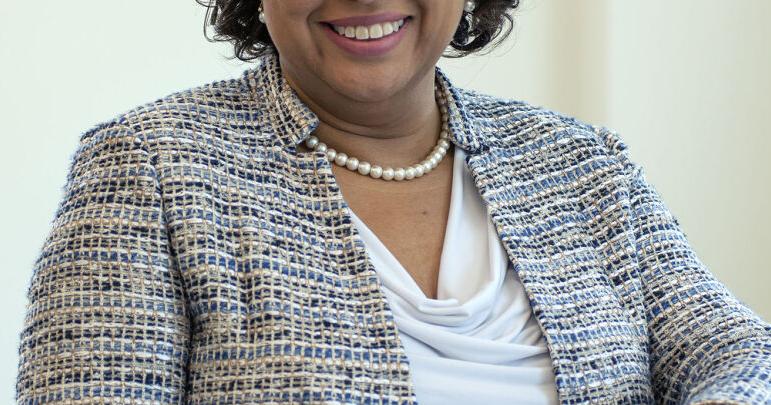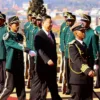
As the war with Hamas grinds on, social media continues to offer an unprecedented window into the state of relations between Jewish and Black Americans.
Many feeds are filled with young African American leaders repeating the words, “From the river to the sea, Palestine will be free” as a call for solidarity with Palestinians — prompting anger and a sense of isolation on other feeds among Jewish groups who know these Hamas-inspired words, at their core, call for the elimination of Israel and its Jews.
These fissures, usually discussed in the relative safety of homogenous community spaces, have been openly aired since the attack on Israel on Oct. 7.
Sadly, this thread of Black and Jewish American tensions runs long and deep. The sentiments reflect the healing that remains in the wake of efforts by civil rights leaders such as Martin Luther King Jr. and Rabbi Abraham Joshua Heschel.
Black and Jewish American communities have fallen prey to the identity politics that use them as chess pieces rather than leaning into hard conversations that require patience, curiosity, and a degree of vulnerability.
Some may forget King was an ardent supporter of the Zionist movement, saying, “We must stand with all our might to protect its right to exist, its territorial integrity.” And Jewish leaders, including Heschel, walked hand in hand with Black Americans in Selma.
These two men personified what it meant to stand in a deep and powerful relationship in which each group recognized the hardships and inequality faced by the other. They believed America could — and must — do better to create a new, mutually beneficial reality.
However, the unity birthed by the Civil Rights Movement frayed in the 1980s under the stress of Middle East relations, urban strife in America between Jewish property owners and Black tenants and differing approaches to addressing apartheid in South Africa. Israel’s decision to continue trade with South Africa led many African Americans to feel the Jewish commitment to civil rights had been compromised, spurring antisemitic sentiment that preceded TikTok and influencers like Kanye West.
This strain inspired Dillard University President Samuel DuBois Cook to establish the National Center for Black-Jewish Relations in 1990. The center at the HBCU in New Orleans was the first of its kind. It built on Historically Black College and Universities’ historic ties to the Jewish community: They were among the few schools willing to hire Jewish scholars who were refugees from Europe after the Holocaust.
Cook was a former classmate and friend of King and aimed to re-energize the Black-Jewish alliance influential in the Civil Rights Movement.
That need exists more than ever today, and earlier this year, Dillard revived the center.
Even before the current war in Israel, research demonstrated that antisemitic sentiments were on the rise, especially among younger African Americans. The research also showed White supremacists on social media were intentionally working to sow discord and divisiveness between Blacks and Jews.
More than a mere generational disconnect from the Holocaust or civil rights movement, this shift reflects the challenges Black and Jewish communities face in articulating a united front on issues of oppression and solidarity.
Indeed, Black liberationist movements rightfully challenge colonial and imperialist ideals around the world. But there’s an alarming trend of viewing Israel through this lens. They misinterpret Israel’s national purpose and Jews’ historical connections to the land of Israel, instead transposing a racial lens onto the region and misappropriating the language of “de-colonization.”
Such divisions have precipitated a competitive dynamic between the two communities, vying for acknowledgment of their struggles and leveraging their historical pain for resources and political influence.
Reducing oppression to skin color fails to address the complex dynamics between Jews and Blacks. While many Jews appear White, it’s reductive to perceive them solely as beneficiaries of white privilege — as evidenced by the discrimination on Jews unleashed this month — and, by extension, the perception of Israel as a White, imperialist outpost is a superficial understanding.
At the same time, Jews must acknowledge that on the scale of American racial worth, they experience a degree of privilege that other minority groups cannot easily ascertain. Engaging in this subject is part of the hard work required right now.
How can we combat the complexity of racial and religious identity politics in America? Education.
Institutions like ours, Dillard and Brandeis universities, play a pivotal role in this dialogue. We can expose communities to diverse perspectives within historical contexts through initiatives like Dillard’s re-establishment of the National Center for Black-Jewish Relations or Brandeis’ recent symposium for university administrators on how antisemitism manifests in the 21st century.
Rebuilding the bonds between our communities requires conversation, education, and action. Condoning hate and extremism has become universally unacceptable. Extremists exploit these divisions to drive wedges where unity should prevail.
Our responsibility, for the benefit of all Americans, Israelis, and Palestinians, is to create a path for progress through engagement and education. After all, knowledge informs how we think and feel and, ultimately, what we say and how we act.
“Speech has power, Rabbi Heschel said. ”Words do not fade. What starts out as a sound, ends in a deed.”
Rochelle L. Ford is the president of Dillard University. Rachel Fish is a special adviser to the president at Brandeis University.


